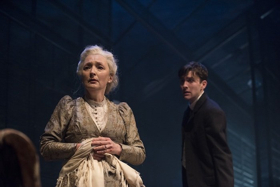Review: LONG DAY'S JOURNEY INTO NIGHT, Wyndham's Theatre
|
![]() Though a long journey indeed, Richard Eyre's is a vital revival, giving vigour to Eugene O'Neill's mighty, semi-autobiographical work and making all the more poignant this tormented but fast-talking family's gradual dwindling into a despairing silence.
Though a long journey indeed, Richard Eyre's is a vital revival, giving vigour to Eugene O'Neill's mighty, semi-autobiographical work and making all the more poignant this tormented but fast-talking family's gradual dwindling into a despairing silence.
 First seen at the Bristol Old Vic in 2016, Eyre's production is full of conversational overlaps, as father James Tyrone, the failed actor, tries to stamp his authority on dissolute sons Edmund, the consumptive, and Jamie, the alcoholic. Yet all are alert to the particular run-on chatter that signals the terrible return of mother Mary's morphine addiction.
First seen at the Bristol Old Vic in 2016, Eyre's production is full of conversational overlaps, as father James Tyrone, the failed actor, tries to stamp his authority on dissolute sons Edmund, the consumptive, and Jamie, the alcoholic. Yet all are alert to the particular run-on chatter that signals the terrible return of mother Mary's morphine addiction.
Balancing this energetic naturalism is the gorgeous, stylistic framing of Rob Howell's design, Peter Mumford's lighting and John Leonard's soundscape. The Connecticut summer home - never a real 'home' - indeed has a desolate, fragile feel to it, while the translucent walls act as both mirrors for characters who are almost painfully self-aware, and as disintegrating barriers to the world outside.
As night falls, it becomes a heartbreaking reflection of the darkness within. The insistent foghorn parallels those truths that must be reckoned with, and the spectral blue evokes Edmund's morbid vision of being at the bottom of the sea, while also setting the stage for a climactic haunting.
Jeremy Irons is fascinating casting for the usually more physically robust James, but makes excellent sense of a man who fancies himself a crack Shakespearean (his mannered verse delivery is fantastic) and the patrician head of the household.
Though at best only making glancing reference to an American accent, he's wryly funny with exasperated lines like "I'm not giving a ball" - when one of his sons dares turn on an electric light - but signals too the traumatic childhood that fuels James's miserliness.
Eyre emphasises those key familial ties: how the past exerts its grasp, and how we continue to influence one another. There's both warm and damaging closeness here - from James and Mary's physical affection or their knowledge of one another's habits, to the ways in which the family members blame one another for various defects.
The tragedy is that they can understand, but not forgive. Again and again Mary excuses James's behaviour - "It's not your fault" - yet his meanness may well be the root cause of her addiction. The family's social isolation, again partly due to James's choices, also contributes to the sons' unhealthy choices.
There's the obvious bad influences, like each urging the other to have just one more glass of whiskey, and subtler effects. The more that James harangues Jamie, the more he sinks into indolence - quite literally, as Rory Keenan (who has an excellent grasp of articulate physicality) lolls into the sofa as a gesture of defiance.
Keenan, too, shows how the generally affectionate big brother Jamie is bewildered by his darker impulses - confessed in a drunken moment - while the Nietzsche-reading, wannabe poet Edmund wallows in them.
Matthew Beard brings a childlike plaintiveness to Edmund - the child "born scared", believes Mary, because she had him after losing another son, Eugene; we understand, too, how literature became such a refuge for the dreamy Edmund. In wonderful contrast is the down-to-earth Irish maid Cathleen, in a great turn by Jessica Regan.
But the towering performance comes from Leslie Manville. Currently Oscar nominated for Phantom Thread, she should be similarly lauded for this performance - impeccably paced with almost musical precision, but so human as to be utterly devastating. Her "Sometimes I feel so lonely" strikes the heart.
Inch by inch, we see Mary losing her grasp on sobriety: the wounded defensiveness in the face of familial suspicion, the twitching urge to get upstairs and top up her dosage, the starry-eyed remembrances of her devout Catholic girlhood that hint at a loss of faith - not just religious, but in herself. Both the doctor and James use the word "willpower", but we can see all too clearly that this bright, caring woman is in the grip of a terrible force.
Eyre, too, creates a memorable portrait of those affected by a loved one's addiction. "This time" is the hopeful, increasingly hollow phrase used again and again. Their pain is all the greater for stemming from real familial tenderness - palpable intimacy fuelling O'Neill's great epic.
Long Day's Journey Into Night at Wyndham's Theatre until 7 April
Photo credit: Hugo Glendinning
Comments
Videos

